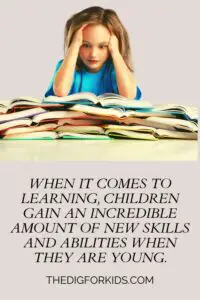When children are young, they are heavily influenced by their environment and surroundings that they spend time in–mainly, their home and family. Healthy child development is impacted by being with parents and family that support their physical, cognitive, social, and emotional requirements. Family support is so important to a child’s development because it plays a role in whether they are meeting developmental milestones and if they are engaging with the world in a positive and appropriate manner.
Studies have shown that children who experience adverse events such as physical, sexual, or emotional abuse or neglect when they are young have much greater challenges throughout their lifetime. When children are not provided with the proper environment to grow and develop, they often experience delays in their physical development as well as their social and emotional functioning. This in turn has an impact as the children grow older as they continue to have deficits in terms of cognitive abilities and appropriate engagement with society.
A child who is surrounded by a loving family that provides the care, attention, and stimulation they need, has a much greater chance of growing up to experience a fulfilling life as an adult. Between the time a child is born and the time they turn five years old, their brain develops at a faster rate than any other time in their life–this critical period is the foundation for all future learning and development. These early years are crucial when it comes to children being exposed to healthy and nurturing environments–the impact on their future cannot be overstated.
Table of Contents
Why Do Children Need Family Support for Physical Development?
Families provide the stimulation that children need for their physical growth which includes brain development as well as gross motor and fine motor skills. Physical development is also improved when children are provided with a safe environment to explore. Families are important for physical development because they offer the security that a child needs–when children feel safe they will take more risks in growing and learning new skills.
In order for babies to develop adequate strength in their neck and shoulder muscles, the family must ensure that the baby spends time each day lying on their tummy. Though not all infants enjoy tummy time, parents or caregivers provide encouragement by being with them and placing toys within their reach. In this way, the family helps the baby to reach important milestones in their physical development.
Parents and families play an essential role in their children’s physical growth and muscle development. In order for young children to develop gross-motor skills such as rolling over, crawling, and eventually walking, they need to be praised for their efforts and reassured that they are safe if they fall. Families also help children to develop fine-motor skills such as grasping a crayon or turning the pages of a book.
How Does Family Support Influence A Child’s Learning?
When it comes to learning, children gain an incredible amount of new skills and abilities when they are young. Families and parents are a large influence on what their child learns, when they learn it, and how quickly they absorb new information. By observing their family and imitating what they do, the child learns to perform different tasks and also develops language skills.
We can see how much of an influence the family has on a child’s language development by looking at children who are raised in bilingual homes. These children grow up learning two–or more–languages and can speak them fluently because they have been surrounded by them in their homes. When parents spend more time talking to their children and reading to them, the children’s vocabulary and language skills develop faster and more comprehensively.
Parents and families not only influence what and how their children learn, but they also have an impact on their child’s approach to learning. When families are able to make learning fun by playing with their children, engaging them in games, and creating activities that inspire them, the child develops a healthy and enthusiastic attitude toward learning. Whereas if a family focuses on unrealistic expectations that are not appropriate for the child’s age or developmental stage, the child will begin to avoid learning opportunities.

Why Is Family Support Important to Children’s Socialization?
Socialization is the way in which children learn to engage with other people in the world. Since children spend the majority of their time with their families, this is where they learn most about social development. When children are young, they observe their parents and siblings to see how they act around other people and they imitate their behavior.
It is important that children learn proper social development when they are young since this has a big impact on how they behave around other people. Prior to entering school or daycare, the young child learns from their family about social interaction with one another. By watching their parents, the child comes to know what is appropriate, such as giving a friend a hug if they are sad–and what is not, for example, hitting someone you are upset with.
Families influence their child’s social skills through direct and indirect teaching. For example, a parent may teach their child about the importance of sharing by explaining the concept and praising the child when she shares with a friend or sibling. The child also learns by watching the parents–seeing one parent give half of their favorite food to their spouse teaches the child the importance of sharing too.
How Is Emotional Development Impacted by Family Support?
Learning how to recognize, express, and control emotions are the keys to proper emotional development as a child. These skills enable the child to have a healthy self-awareness and help them to develop positive relationships with other people. The parents and family are an integral part of establishing an environment in which emotional development will take place.
One of the ways in which families help their children’s emotional development is by teaching them what different emotions are called and what they feel like. When a child is upset because their sibling took a toy away from them, that child can state that they are feeling angry instead of lashing out and hitting the other person. By teaching the child to name the emotions, parents give them the power to express how they are feeling.
Regulating or controlling one’s emotions is also learned in the family environment when a child is young. For example, through observing their parents have a discussion with each other about something they are feeling strongly about, the child learns that it is possible to remain in control of their feelings even when they are intense. On the other hand, a child who witnesses physical fights or abuse between parents learns that emotions cannot be regulated.
Final Thoughts on Family Support
It is clear that children need family support for their physical development, learning, socialization, and emotional development. By providing the child with a healthy and secure environment, the family gives them an opportunity to explore and grow in the context of a safe place. Children learn and develop through the intentional actions of their family members as well as through observation and imitation.





